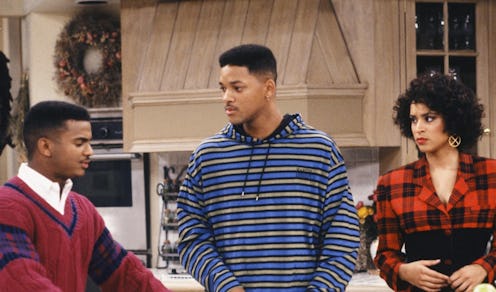Entertainment
The One '90s Sitcom To Rewatch As An Adult

Even though it aired in the '90s, I believe The Fresh Prince of Bel-Air is uniquely relevant to today. And no, not just because we're all crushing hard on '90s fashion and Jada Pinkett Smith. Fact: You should rewatch The Fresh Prince Of Bel-Air as an adult, simply because there's no other series from that time that seems so relevant to how it feels to be a young adult in this era. The aspect of the show that sticks with me most is the characterization of Will. Will Smith's fictionalized self is supposed to be a teenager, and yet he's peculiarly adult in his emotions.
Perhaps it's just his being placed alongside other, less street-savvy teenagers like Hilary, Carlton and Ashley, but he seems so self-assured and independent. Sure, he doesn't always get things right — the obvious example being the first dinner party his uncle and aunt throw where Will proceeds to play the drinking glasses like an instrument with his fork. He doesn't understand that playful behavior at a formal event is inappropriate. Arguably, Will's behavior in this context is about being raised in a working class environment and what situations he has previously been exposed to, rather than his being young. Note his comment: "Any requests?" He's still charming, he's still reading the room.
This is interesting, because in some ways, the show has an unusual set-up: It places someone who's effectively readable as an adult back in a child-like situation, living with parents (or in this case, parent stand-ins). This makes it the perfect show for now. The recession has changed up our story, too. It's no longer a given that as an adult you'll live with friends, a partner, or solo.
Between 2007 and 2014 in the U.S., the number of adults living with their parents rose by 6 percent. It was reported this year that almost 67 percent of 15-29 year olds live with their parents. Will's situation becomes curiously poignant on a rewatch — it feels much like going over to hang out with your friend who's still living with their parents (or relatives — presumably I'm not alone in having friends living in New York City with grandparents, just to get by).
Like you post-college, Will moves in with his aunt and uncle while believing he, and he alone, knows what's up in life. Whether he's teaching his younger cousin to rap her prayers or flirting with women in his relatives' house, he operates like someone who's used to having free rein and making his own decisions, rather than tailoring his behavior to fit in with the older generation's standards.
The key difference between Will and the average teenager is that he seems blissfully unaware that he's doing anything that could be interpreted as rebellion — despite what the intro song seems to suggest about his mother in Philadelphia being bothered by his behavior ("I got in one little fight and my mom got scared"), the nature of someone else telling him what to do seems alien to him. Generally, Will isn't acting out to annoy his relatives — he's just being himself.
The other key difference is that Will often seems to assume the role of a teacher with his cousins, teaching his cousin Ashley how to stand up to bullies (see below) or showing Carlton how to chat up women. This builds on the idea that Will is in that weird midway point between child and full-fledged adult that so many millennials can identify with. He has all the knowledge to operate independently in the world — he just lacks the funds.
The parallel becomes even more poignant when you consider the two times Will tries to move out of his uncle and aunt's house during the series before realizing he can't afford it and moving back in — three, if you count the time he lives in the pool house. Like many of us, Will makes do with the situation at hand and finds cohabiting with the generation above is both frustrating and enlightening all at once.
The last scene of the last episode of the show — in which Will's uncle, aunt, and cousins move out of the house, leaving him alone there to finish his studies —suggests the bittersweet set-up of our financial realities. Will hugs all of his cousins, these people who are nothing like him and who he has very little in common with, beyond blood — and you realize how much they mean to him. We realize that this set-up may be difficult, but it's been rewarding. Will has been forced to inhabit viewpoints alien to his own and learn how to accommodate behavior expected from him from the older generation. In the final scene, standing in the house, emptied of furniture and surrounded by space, Will has what few of us in this generation will ever have — a highly luxurious place of his own in an enviable zip code. But he's never looked so lonely.
So maybe that's why The Fresh Prince Of Bel-Air is the '90s rewatch you need to line up as an adult. It's a deeply familiar vision of being an adult in a child-like set-up — and it suggests why, contrary to every other thinkpiece about millennials you've read, that might actually be a good thing.